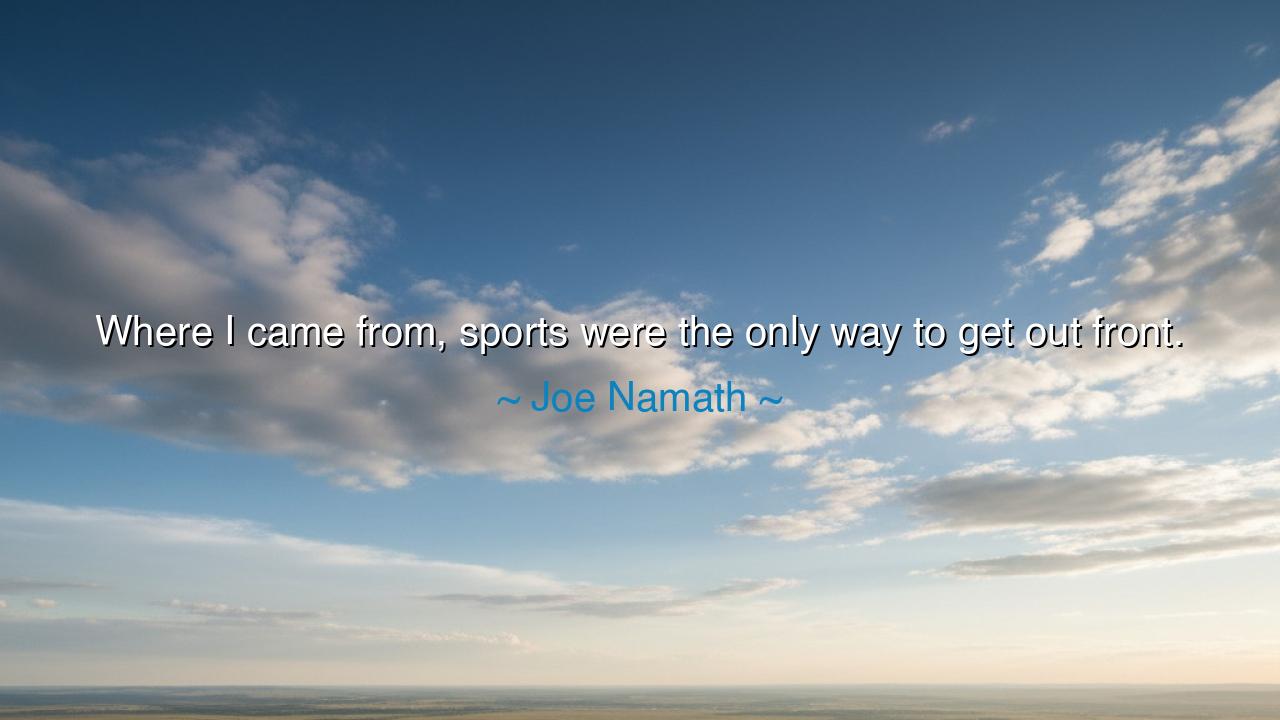
Where I came from, sports were the only way to get out front.






The words of Joe Namath, “Where I came from, sports were the only way to get out front,” resound with the raw honesty of one who knew both hardship and triumph. In them we hear the voice of a man who grew up in the humble fields of Pennsylvania, where the paths of opportunity were few, and the roads to greatness narrow. For him, and for many like him, sports were not mere games, but a ladder out of obscurity, a stage upon which to prove worth, and a doorway through which one might step into a larger world. His words are not boastful, but reverent—a tribute to the power of sport to transform lives.
The origin of this thought lies in the steel towns and working-class neighborhoods where Namath was raised. In such places, wealth was scarce, and education often limited by circumstance. The young learned early that their choices were few: to labor as their fathers had, or to find some rare chance to rise beyond. For some, this chance was found in art or study, but for many, it was found in the arena of competition, where talent and determination could lift one into the light. To say that sports were “the only way to get out front” is to confess that for some, the game was not a pastime but a path to survival and dignity.
History gives us many mirrors of this truth. Consider the story of Jesse Owens, born into poverty as the son of sharecroppers. For him, running was not merely about medals—it was about transcending the boundaries placed upon him by poverty and prejudice. His fleet feet carried him not only to Olympic gold in 1936, but into history, showing the world that greatness could emerge from the humblest soil. Like Namath, Owens knew that sport could be the road by which one leaves behind obscurity and steps into immortality.
Yet Namath’s words also speak to something universal: that opportunity often hides within struggle. Many who have little are forced to pour themselves wholly into the few avenues open to them, and in doing so, they achieve greatness. This is not a lament, but a reminder of the strength born of limitation. For the one who has only a single path must walk it with ferocity, while the one with many paths may wander without resolve. Namath chose his path, and through sweat and courage, he stepped “out front.”
The lesson for us is clear: do not despise the narrowness of your circumstances. Instead, see them as the forge of focus. If life gives you but one open road, run upon it with all your might. If the gates of opportunity are few, then let your determination batter them until they yield. For greatness is not always found in abundance; it is often born in scarcity, when a single path demands all of one’s heart.
Practically, this means embracing discipline and vision. Whether your path is in sports, in study, in work, or in art, give yourself wholly to it. Do not wait for endless doors to open, but walk through the one that is before you. Pour your energy into your craft, and let it become the means by which you rise. And when you have risen, remember as Namath did, where you came from, and how the struggle shaped you.
So, beloved listener, hear Joe Namath’s wisdom: “Where I came from, sports were the only way to get out front.” His words are not only about football fields and stadium lights—they are about the eternal truth that struggle can be transformed into triumph. Whatever your path, let it carry you forward with the same courage. And when you reach the light, do not forget the shadows from which you emerged, for it is in remembering them that your victory gains its true meaning.






AAdministratorAdministrator
Welcome, honored guests. Please leave a comment, we will respond soon